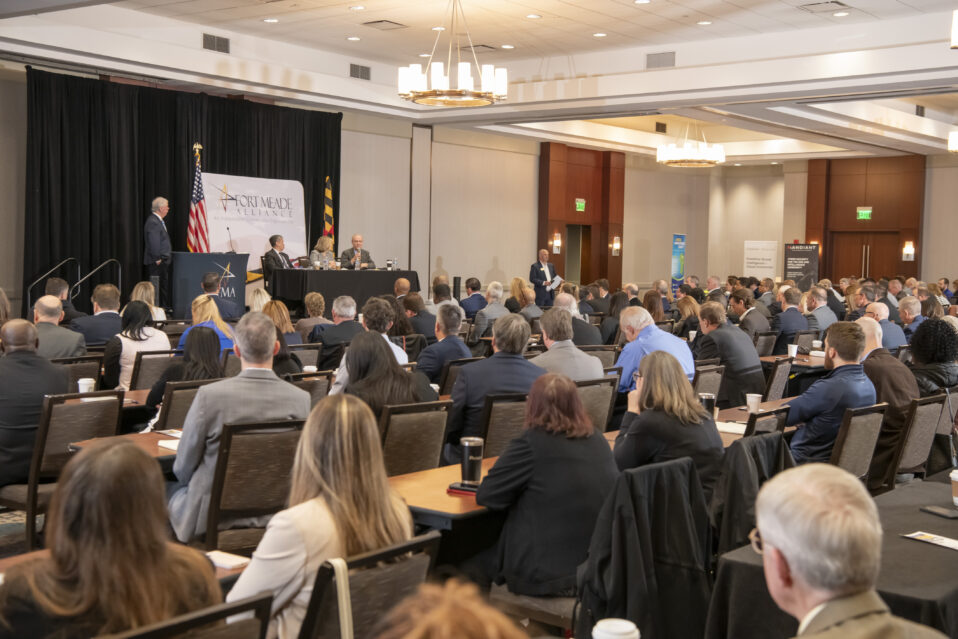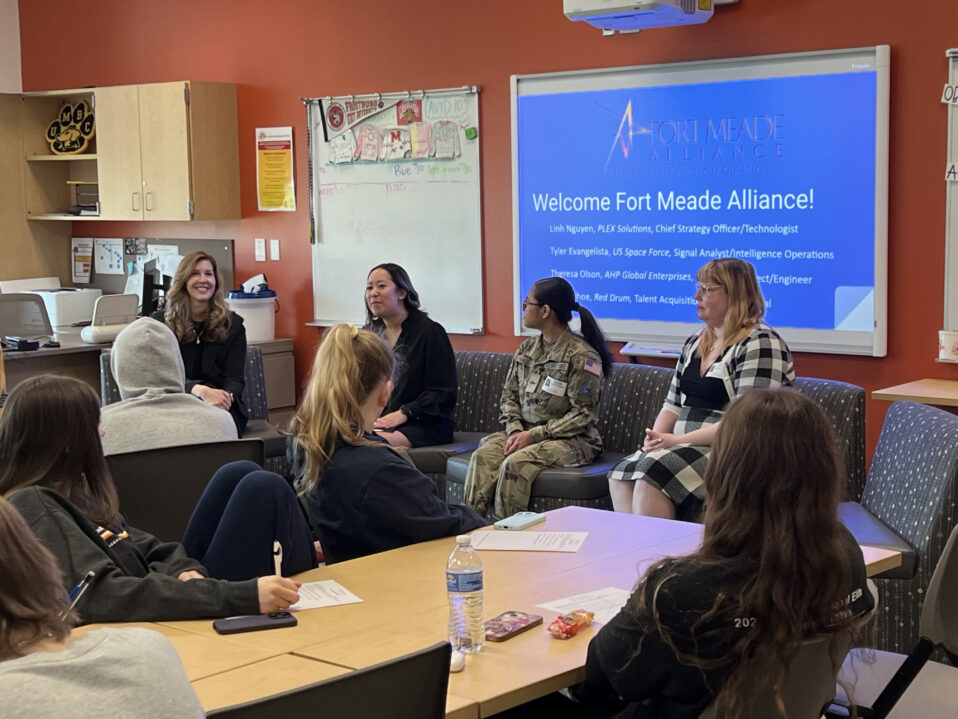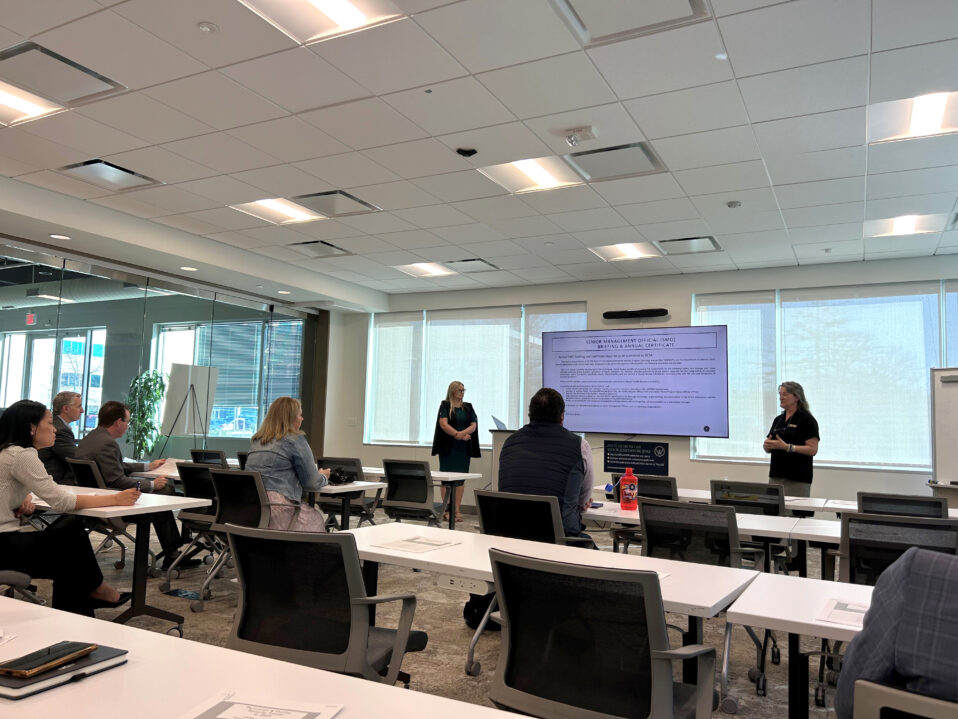 Sitting at a picnic table outside her workplace on a humid July afternoon, Maria Marinelli describes the experience of co-founding her company, Calibyr Corporation.
Sitting at a picnic table outside her workplace on a humid July afternoon, Maria Marinelli describes the experience of co-founding her company, Calibyr Corporation.
Like many FMA small business owners at Fort Meade, Marinelli and business partner, Seth Marple, work directly on-contract throughout the week while also juggling the formidable work of growing a startup. Both had spent years working for large and small contractors at the fort before striking out on their own in mid-2019 to start Calibyr – a company that aims to become a frontrunner in technical excellence and corporate culture. They obtained their facility clearance in mid-2021, landed multiple subcontracts, placed six new employees on contract and continue to grow.
Through their previous employers, Marinelli and Marple had gained valuable experience in business development, proposal writing, hiring, technical leadership and project management — experiences that many engineers don’t have before starting their businesses. Still, there were other critical areas – accounting/finance, security, and HR — where the partners needed professional support so they sought advice from mentors who had been through the same startup process.
“Many founders at the fort start their company because they want to make an impact on a larger scale, advancing the mission and creating their ideal workplace culture for future employees” said Marinelli. “However, the range of skills and expertise needed to start and grow a company in this industry can be a major hurdle for new businesses. Expediting the learning curve by engaging the right professionals where needed and learning from mentors is critical.”
Consequently, some Fort Meade Alliance members have started discussing the value of providing mentoring services that are tailored to micro-businesses (about 1-20 FTEs). In the wake of multiple mergers and acquisitions in recent years, such services could also help replenish the local population of small business contractors, and provide the essential talent and innovation needed for government mission success.
Shana Cosgrove, CEO of Nyla Technology Solutions, became acutely aware of the need for micro-business mentoring during the pandemic. After many entrepreneurs approached her about startup issues, she created Mentoring Mondays – monthly meetings that included a presentation on a core business topic and an opportunity for micro-business leaders to learn from both subject matter experts and each other.
“When you are starting out, you may be an engineer or an analyst with exceptional skill and ability to contribute to mission, but you don’t know how government contracting works. You don’t know the people or government policies or contracting tools. And a lot of the information you need is not something you would get from a business school because it is very specific to this environment,” Cosgrove said.
When she founded Nyla, Cosgrove gained that essential business education by “booking a lot of lunches and collecting random bits of information from people. I learned through sheer will, asking questions and fumbling my way through.”
That entrepreneurial work is squeezed in during lunch hours, early mornings, late nights and stepping outside of secure facilities for phone calls.
By contrast, participants in her Mentoring Mondays gained focused, expert advice on topics ranging from security clearances to recruiting staff to the challenge of juggling the seemingly endless tasks needed to grow a company. The group also provided an avenue for connecting with other business owners in the same stage of their founder’s journey and sharing lessons learned with each other.
“Obtaining a facility clearance, especially during COVID, can be a major hurdle,” said Marinelli, who was a regular participant in Mentoring Mondays. “We talked about how to develop and present your capabilities to a Prime to show the unique value your company would bring to the Customer’s mission. During the span of the Mentoring Mondays sessions, multiple companies were able to secure sponsors for their facility clearances, which is incredible.”
“There are a lot of hang-ups to growing a small business,” said Bill Dunahoo, President of Nexxis Solutions, formerly of Praxis Engineering and current Chair of the FMA Meade Business Connect Committee.
For example, trouble with finding the right banker, tailoring your accounting systems for government contracting or setting appropriate rates can significantly slow a company’s development.
“With good guidance a company might be able to avoid those hang-ups. Instead of taking a year to accomplish something, they might be able to work through it in three months,” Dunahoo said.
Mentoring, Cosgrove said, can trigger “increased growth and maturity in small businesses so that they are not lingering in the painful baby state forever. By helping more companies thrive, mentoring can increase competition and increase the quality of execution so that large businesses and government clients know they can trust these small companies to deliver.”
The government contracting market, Dunahoo added, needs a steady supply of new, thriving companies to execute essential missions.
“Small businesses — with their creativity, their diversity, how they think and work — have impact on missions,” Dunahoo said. “Often, they can recruit and retain super talented people who just want to do the coolest work and see a small company as the place where they can excel.”
Jonathan Pernell, Founder of Bolt Innovations Group, hopes his micro-business can become part of a thriving small business sector in the Fort Meade Region.
“It takes a whole community of companies to attract and retain the talent that our country needs. Everybody doesn’t want to work for the same kind of employer, so the diversity of companies is definitely needed for our survivability,” Pernell said.
With 22 years of experience in government contracting, Pernell set out to create a “bold and transformative” company that provided an attractive work culture to young, innovative technology professionals and focused on serving clients seeking leading-edge solutions to mission challenges.
Despite his contracting experience, Pernell welcomes the opportunity to receive mentoring to help him through several micro-business challenges. In addition to refining HR policies and securing the kinds of clients and contracts that match Bolt’s mission, one of his top challenges is branding.
“Bill Dunahoo built Praxis with a brand that became so fully recognized that when he started Nexxis, it was easy for people to recognize what that company would be,” Pernell said. “I want to build a brand so that when people look at Bolt, they know what our culture is and we attract talent that is a good fit. I need to learn what it takes to build that strong, recognizable brand and what I need to do in the early stages of the company to entrench that brand and make sure it lasts.”



